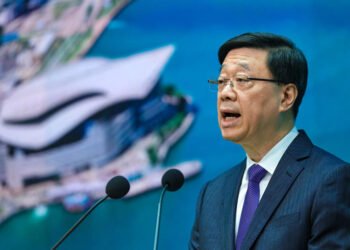According to South Korea’s military, North Korea has launched multiple short-range ballistic missiles towards the sea off the country’s east coast.
South Korea’s Joint Chiefs of Staff (JCS) announced that the missile launches were detected on Tuesday, January 14, 2025, morning at approximately 9:30am local time (00:30 GMT) and were believed to have originated from North Korea’s Jagang Province.
The missiles were said to have travelled up to 250km (155 miles) before landing in waters between the Korean Peninsula and Japan.
The JCS said that it was preparing for additional missile launches and that the South Korean military had strengthened monitoring of North Korea’s activities.
It added that Seoul was closely sharing information with US and Japanese counterparts while “maintaining a full readiness posture.”
The JCS stressed, “We strongly condemn the launch as a clear provocation that seriously threatens the peace and stability of the Korean Peninsula,” warning North Korea against “misjudging” the situation and pledging to “overwhelmingly respond” to any additional provocations.
The presidential office also convened a security situation review meeting, presided over by second deputy national security adviser In Seong-hwan, to discuss the North Korean missile activity and future countermeasures. “The government will closely monitor North Korea’s movements and maintain a state of full readiness to respond to any provocation,” it said in a statement.
South Korea’s Acting President, Choi Sang-mok averred that the country would sternly respond to North Korea’s latest missile launch, and condemned Pyongyang’s continued violation of United Nations Security Council resolutions prohibiting such weapons tests.
The launches on Tuesday were the second so far this year after North Korea test-fired a new type of hypersonic intermediate-range missile on January 6, 2025.
Pyongyang emphasized that the January 6 test was of a new hypersonic missile designed to strike remote targets in the Pacific.
North Korean leader, Kim Jong Un has promised to expand his collection of nuclear-capable weapons to counter rival nations.
At a year-end political conference, Kim also said he would implement the “toughest” anti-US policy so far.
He also criticised Washington’s efforts to strengthen security cooperation with Seoul and Tokyo, which North Korea views as the development of a “nuclear military bloc for aggression” that is focused on toppling his regime.
Experts opined that the latest launch could be intended as a message to the incoming US President.
Yang Moo-jin, President of the University of North Korean Studies in Seoul, said “It may indicate an intention to put pressure ahead of the Trump administration’s second term.”
Ahn Chan-il, a defector-turned-researcher who runs the World Institute for North Korea Studies, told a news agency that the test launch “appears to be an intention to assert presence ahead of the Trump administration.”
He said that it could also be aimed at “destabilising South Korea during Seoul’s own period of turmoil”, as suspended President Yoon Suk Yeol’s impeachment trial started on Tuesday over his failed martial law bid.
Japan Aware Of Missile Launch
Meanwhile, Japan’s Chief Cabinet Secretary, Yoshimasa Hayashi said that he was aware of the missile launch.
Hayashi stated during a press conference in Tokyo that no missiles had entered Japan’s territory or exclusive economic zone (EEZ). “The government is committed to maintaining vigilance and conducting surveillance activities,” Hayashi said, adding that Japan is closely cooperating with the United States and South Korea to analyze the situation.
He disclosed that Tokyo was taking all possible measures to respond through close cooperation with Washington and Seoul, including real-time sharing of missile warning data.
Regional tensions remain high, with allied nations increasing their monitoring efforts in response to North Korea’s provocations.
READ ALSO: Dafeamakpor Challenges Minority Leader’s Interpretation of National Security Ministry’s Legal Basis























